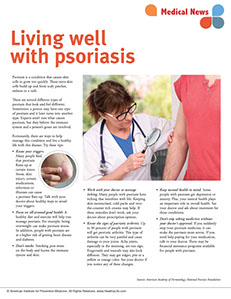Living well with psoriasis

Print on Demand
Psoriasis is a condition that causes skin cells to grow too quickly. These extra skin cells build up and form scaly patches, redness or a rash.
There are several different types of psoriasis that look and feel different. Sometimes, a person may have one type of psoriasis and it later turns into another type. Experts aren’t sure what causes psoriasis, but they believe the immune system and a person’s genes are involved.
Fortunately, there are ways to help manage this condition and live a healthy life with this disease. Try these tips:
• Know your triggers. Many people find that psoriasis flares up at certain times. Stress, skin injury, certain medications, infections or illnesses can cause a psoriasis flare-up. Talk with your doctor about healthy ways to avoid your triggers.
• Focus on all-around good health. A healthy diet and exercise will help you manage psoriasis. For example, being overweight can make psoriasis worse. In addition, people with psoriasis are at a higher risk of getting heart disease and diabetes.
• Don’t smoke. Smoking puts stress on the body and harms the immune system and skin.
• Work with your doctor to manage itching. Many people with psoriasis have itching that interferes with life. Keeping skin moisturized, cold packs and over-the-counter itch creams may help. If these remedies don’t work, ask your doctor about prescription options.
• Know the signs of psoriatic arthritis. Up to 30 percent of people with psoriasis will get psoriatic arthritis. This type of arthritis can be very painful and cause damage to your joints. Achy joints, especially in the morning, are one sign. Fingernails and toenails may also look different. They may get ridges, pits or a yellow or orange color. See your doctor if you notice any of these changes.
• Keep mental health in mind. Some people with psoriasis get depression or anxiety. Plus, your mental health plays an important role in overall health. See your doctor and ask about treatment for these conditions.
• Don’t stop taking medicines without your doctor’s approval. If you suddenly stop your psoriasis medicine, it can make the psoriasis more severe. If you need help paying for your medication, talk to your doctor. There may be financial assistance programs available for people with psoriasis.
Sources: American Academy of Dermatology, National Psoriasis Foundation
SYMPTOM CHECKER
CONDITIONS
Male
Female
Child
Arm, Hand & Shoulder Concerns
Legs & Feet Concerns
Dental & Mouth Concerns
Ear & Nose
Eye Conditions
Head Conditions
Arm, Hand & Shoulder Concerns
Legs & Feet Concerns
Front
Back
Arm, Hand & Shoulder Concerns
Dental & Mouth Concerns
Ear & Nose
Eye Conditions
Head Conditions
Arm, Hand & Shoulder Concerns
Dental & Mouth Concerns
Ear & Nose
Eye Conditions
Head Conditions
Front
Back
Arm, Hand & Shoulder Concerns
Neck Links
Head & Neck Concerns
Arm, Hand & Shoulder Concerns
Neck Links
Head & Neck Concerns
Front
Back
Online Clinic
Wise Healthcare
This website is not meant to substitute for expert medical advice or treatment. Follow your doctor’s or health care provider’s advice if it differs from what is given in this guide.
The American Institute for Preventive Medicine (AIPM) is not responsible for the availability or content of external sites, nor does AIPM endorse them. Also, it is the responsibility of the user to examine the copyright and licensing restrictions of external pages and to secure all necessary permission.
The content on this website is proprietary. You may not modify, copy, reproduce, republish, upload, post, transmit, or distribute, in any manner, the material on the website without the written permission of AIPM.
2021 © American Institute for Preventive Medicine - All Rights Reserved. Disclaimer | www.HealthyLife.com















































